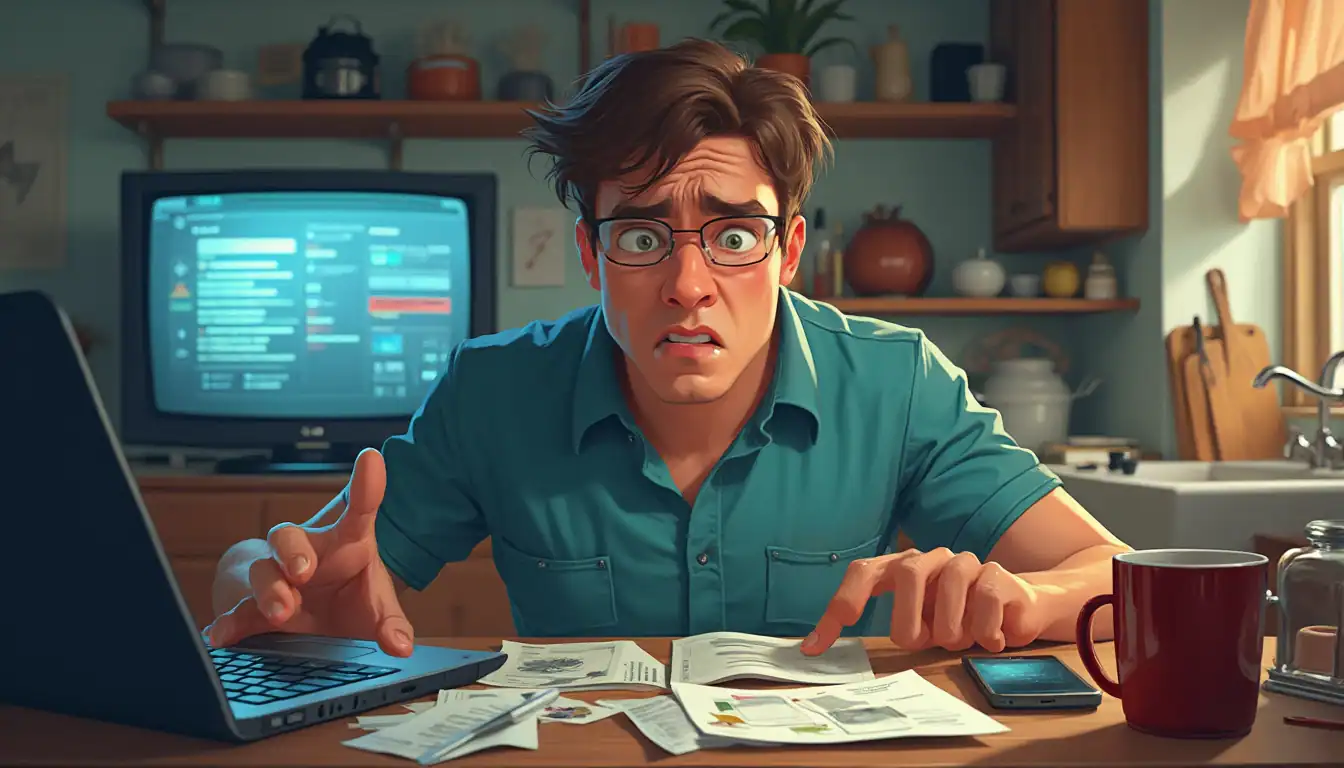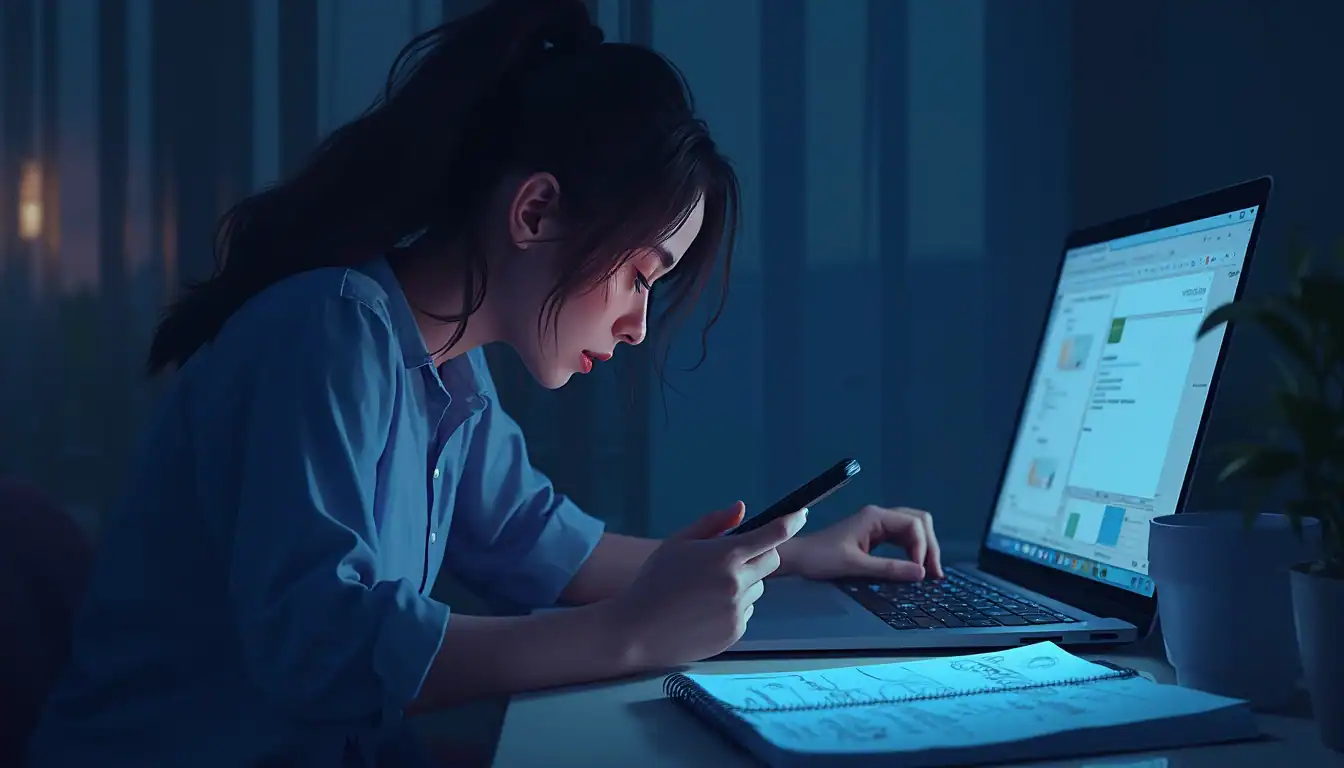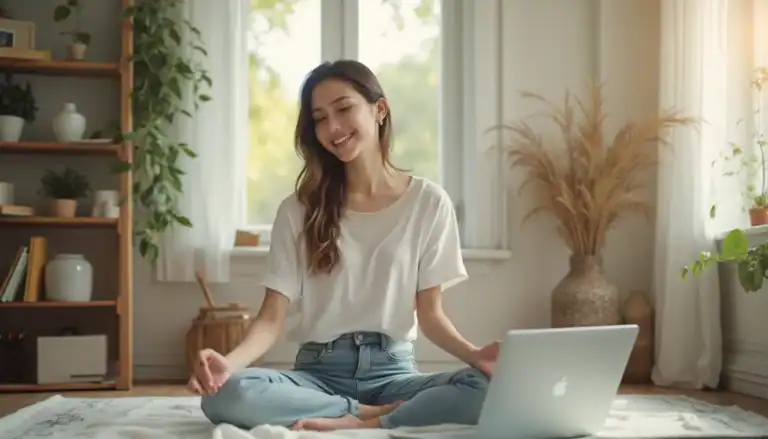Screen Time and Anxiety Relationship: Understanding the Connection

Let me tell you something that took me way too long to figure out – that knot in your stomach you get after scrolling through your phone for hours isn’t just random. It’s your brain responding to the digital overload you’ve been feeding it all day.
Many studies have already shown that screen time is positively correlated with stress, anxiety and even depression.
I used to think I was just naturally an anxious person. You know how it is – you wake up, immediately grab your phone to check messages, spend your commute scrolling through news feeds, work on a computer all day, then come home to binge Netflix while simultaneously checking Instagram. Sound familiar? This was my daily routine for my teenage years, and I couldn’t understand why I felt like I was constantly on edge.
There is not just one mechanism through which screen time can lead to or increase anxiety. It is a combination of many things like: sensory overload, FOMO induced stress, imbalanced neural pathways, feelings of being disconnected, and many more.
As well as there are many mechanisms, there are many different problem apps or websites. All of which are no problem if used in moderation, but if you overdo it. Social media, porn, games, news, chats, etc, can mess up your brain and lead to a feeling of uneasiness. This can if not adressed proberly lead to anxiety of various forms. The most common is social anxiety.
So if you are anxious, and you do not even know why, then there is a high chance that it comes from a problematic relationship with your phone or other devices. In this article, I am about to show you the screen time anxiety relationship, what the mechanisms behind it are, so that you gain a better understanding of your psyche and so that you can maybe make better decisions about how you are going to use your devices in the future.
What is Anxiety exactly

Just to be sure we are on the same page before we dive into all the mechanisms, I want to have a quick look about anxiety en general. Anxiety is not the same as fear.
Anxiety is a natural emotional response characterized by feelings of worry, nervousness, and apprehension about future events or uncertain situations. While occasional anxiety is normal and can even be helpful in motivating us to prepare for challenges, it becomes problematic when it’s excessive, persistent, or interferes with daily functioning.
There are many different kinds of anxiety disorders. There are more general ones like Generalized Anxiety Disorder and then there are very specific ones like spider phobia. Those are all part of the anxiety disorders. The important point here is that anxiety has various forms. Everyone is anxious at times, but clearly having any kind of full-blown anxiety disorder is no fun at all.
It is extremely stressful and can lower your quality of life a lot. I mean, just imagine if you had to live your life always being afraid of social encounters, that’s tough.
The Science Behind Screen Time and Anxiety

When I was a teen, I didn’t possibly think that screen time could at all be related to any negative outcomes, except maybe being tired at the end. I just loved gaming, watching YouTube videos, and sadly, also lots of porn. It was not until I became more ambitious and thought I wanted to be more productive that I started to realize how messed up my brain was. Then I was quickly able to link to my insanely high screen times.
As I have said before, there is no clear, straightforward cause for this; a lot is happening here. I will try to give you an overview of the most important processes through which screen time can lead to anxiety.
Blue light
Blue light emission from our devices doesn’t just strain our eyes; it literally tricks our brains into thinking it’s daytime. I discovered this the hard way when I couldn’t figure out why I always needed 30 to 90 minutes to fall asleep. Turns out, blue light suppresses melatonin production by up to 23% according to research from Harvard’s Sleep Medicine Division.
When melatonin gets disrupted, our entire circadian rhythm gets off-balance, and bad sleep is the number one risk factor for any mental disease, including anxiety. Concluding that blue light in the evening can definitely lead to or increase your anxiety levels.
Cortisol levels
Cortisol is our body’s primary stress hormone. Every time we get a notification, check social media, or even just switch between apps, our brains release small amounts of cortisol. It’s like having a tiny alarm going off in your head all day long. For example research from Munich’s medical school showed that excessive screen exposure can is positively associated with elevated cortisol levels.
It really depends on what you are doing on your screen, but if you’re playing intense games or scrolling through endless feeds, then your brain will be permanently on the edge. You will be stressing yourself out! I mean, did you ever feel completely relaxed and at ease after 30 min of mindless scrolling? Stress and anxiety are basically brother and sister; symptoms are similar, and one can, over time if not appropriately addressed turn into the other.
Dopamine
Here it is again, the mystical dopamine. The reward neurotransmitter. Everyone has heard of it nowadays. It is often a little misunderstood, still it plays a huge role here as well.
Everything from social media to films to gaming is designed so that it hijacks our dopamine system. Especially, social media is essentially designed to act like a slot machine, one of the most addictive devices ever. When we are overusing our devices, apps, and websites, we are essentially roasting our dopamine system and slowly developing an addiction. Addiction and anxiety are closely related as well.
While it is more often than not the case that anxiety leads to addictions (mainly drugs to numb the feelings), it can also go the other way. When our dopamin system is out of balance, we are in a constant stimulation-seeking mode. And constant stimulation leads us to the next point:
Overstimulation
One study from the University of California found that people check their phones an average of 96 times per day – that’s once every 10 minutes during waking hours. It is simply too much to handle for our nervous system. There are so many different inputs, we are seeing this funny reel, that interesting post, and playing a super exciting horror game. There are so many different emotions, feelings, and sensations for your brain to process.
Just think about how many inputs a brain 10’000 years ago had. Life was much calmer and our brains much more relaxed. While all the other reasons we just looked at are more complex. This one is simpler: It and overload and our brain can not process it all. We are simply exhausted and confused at the end of our days. The perfect breeding ground for any insecurity to develop into a full-blown anxiety.
The parasympathetic nervous system is basically our body’s “rest and digest” mode. Constant digital stimulation keeps us stuck in sympathetic nervous system overdrive, where we’re always ready for fight-or-flight responses. However, our body need the relaxation the regenerative parasympathicus provides.
The adverse effects of porn
To many, this might be surprising, but I can not talk of screen time-induced anxiety without mentioning porn. I mean, porn sites get more clicks than Amazon and Netflix combined. So they are likely a big part of your screen time as well.
Because I know from personal experience how porn can mess up the brains of any people but especially young adults. While many of the effects porn has on us humans are still being discovered, there are already many scientific papers that show its possible adverse effects.
The effects porn can have on the sexual system of young adults, mainly through changes in testosterone, estrogen, and by conveying wrong gender stereotypes, can often lead to social anxiety or similar.
If you want to learn more about that, there is no better place for it than YBOP:
Healthy Screen Time Boundaries for Mental Well-being

This post is mainly about the mechanisms behind screen time and anxiety, but I want to spend a short time giving you some ideas of reducing your screen time if you think it’s too much.
The first thing that actually worked for me was tracking my current usage without judgment. I used the built-in Screen Time feature on my Google Pixel for a week, and wow, the results were eye-opening. If you never looked at your screen times, it’s probably way higher than you think. Just realizing how much time you spend on your devices will maybe make you wanna change something.
Setting realistic daily limits and blocking some apps in the morning and late evening is super helpful. There are dozens of apps you can use for that, and it truly makes a difference. Just don’t cheat on yourself. The hard thing is to have an honest conversation with yourself about how much time you actually want to spend on your devices.
Creating tech-free zones in my home was probably the most impactful change I made. My bedroom became my number one no-phone zone. This is the easiest change with the highest impact that you can make
If you’re interested in that topic you can read more about it here.
Conclusion
So what we learned is that clearly spending too much time on your screens won’t directly cause any anxiety disorders. However, it can disrupt many of the mental processes in your body, and this can make you more vulnerable to anxiety. Stuff will stress you out more than others, you will maybe feel less confident, and because of that, you’re handling social situations more poorly….
It is not simple, it never is with psychological problems. We can’t just blame our screens, but we should be critically evaluating the time we spend on our devices and assess whether we are taking on unnecessary risks to our mental health.
If your screen time anxiety is affecting your relationships, work performance, or causing physical symptoms like headaches and sleep problems, don’t hesitate to talk to a mental health professional. A therapist can help you develop personalized strategies and identify underlying triggers that might be driving excessive screen use. Anxiety isn’t just about the screens themselves – but they might be a way we’re avoiding dealing with other stresses in our lives.






